MercoPress. South Atlantic News Agency
Latin America
-
Wednesday, March 20th 2013 - 07:46 UTC
Venezuelan presidential candidate Capriles pledges “not another drop of oil to Cuba”
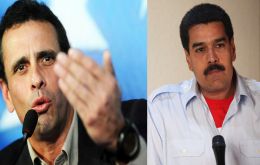
Venezuelan opposition presidential candidate on Monday vowed to end the OPEC nation's shipments of subsidized oil to the Castro brothers regime in Cuba, slamming acting President as a puppet of Havana.
-
Tuesday, March 19th 2013 - 06:26 UTC
Opposition candidate leads vote intention for Paraguay’s presidential election in April

With just over a month for Paraguay’s presidential election the opposition candidate from the Colorado Party, Horacio Cartes is ahead with 37.3% vote intention followed by Efrain Alegre who represents the ruling Alianza with 30.3%, according to a public opinion poll contracted by the Asunción newspaper ABC Color and released on Monday.
-
Tuesday, March 19th 2013 - 06:22 UTC
Corruption reports on several OAS country members and private sector involvement

The Committee of Experts of the Mechanism to Follow Up on Implementation of the Inter-American Convention against Corruption, MESICIC of the Organization of American States began its 21st Meeting with an agenda that includes the approval of reports on Peru, Costa Rica, Argentina, Trinidad and Tobago and Honduras, and a discussion on the responsibility of the private sector in the fight against corruption.
-
Monday, March 18th 2013 - 21:37 UTC
Rough times ahead for Latam warns IDB; limited margin for fiscal and monetary policies
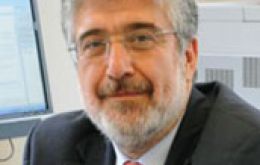
World growth is likely to be suppressed below potential for several years to come, but Latin America and the Caribbean can escape this global outlook and boost growth significantly by adopting appropriate structural reforms, according to the Inter-American Development Bank’s annual macroeconomic report, released at the IDB annual meeting.
-
Monday, March 18th 2013 - 21:13 UTC
Argentina should be self-sufficient in energy in five/six years says YPF

Argentina’s energy self-sufficiency can be expected in five to six years said Miguel Galuccio, CEO of YPF, the oil and gas corporation which was nationalized a year ago when the government of President Cristina Fernandez seized a 51% majority from Spain’s Repsol.
-
Monday, March 18th 2013 - 20:52 UTC
Bachelet returns to Chile for primaries; good chances of becoming opposition presidential candidate
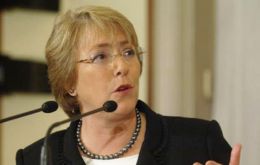
Former Chilean president Michelle Bachelet who resigned to her job as the Executive Director of UN Women is to be proclaimed as the leading presidential candidate at the opposition parties primary elections to be held next April 13. She has very good chances of repeating her four year period, according to public opinion polls.
-
Monday, March 18th 2013 - 08:22 UTC
“The people of the Falklands have spoken clear and loud”, MLA Hansen tells Trinidad and Tobago
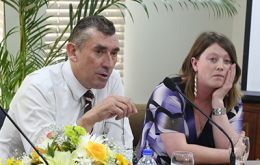
The Falkland Islands have spoken, and have spoken clearly and loud for all countries in the world to listen, said Ian Hansen, member of the elected Falkland Islands Legislative Assembly currently on a tour of Caribbean countries to deliver the message from the March 10/11 referendum.
-
Monday, March 18th 2013 - 08:02 UTC
China will provide 2bn dollars for Latam development projects through IDB
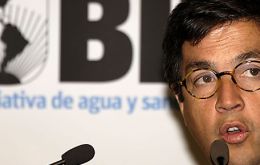
China will provide up top 2 billion dollars for an Inter American Development Bank (IDB) fund, in support of projects for the public and private sector that promoted sustainable growth in the region.
-
Monday, March 18th 2013 - 07:20 UTC
Peruvian capital Lima’s first woman mayor narrowly survives recall vote
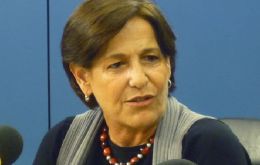
The first woman mayor of Peru's capital Lima, Susana Villaran, has narrowly survived a vote to depose her from office, exit polls suggest. They indicate that Ms Villaran was backed by about over 50% of voters.
-
Saturday, March 16th 2013 - 07:41 UTC
Millions turned out in Caracas for the final farewell to Hugo Chavez

Hundreds of thousands of Venezuelans took to the streets of Caracas on Friday to bid a final farewell to late president Hugo Chavez a month before elections to pick his successor.
